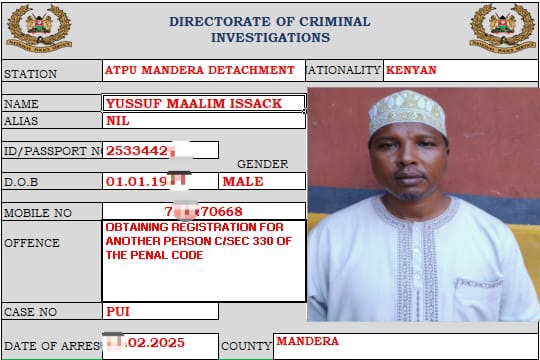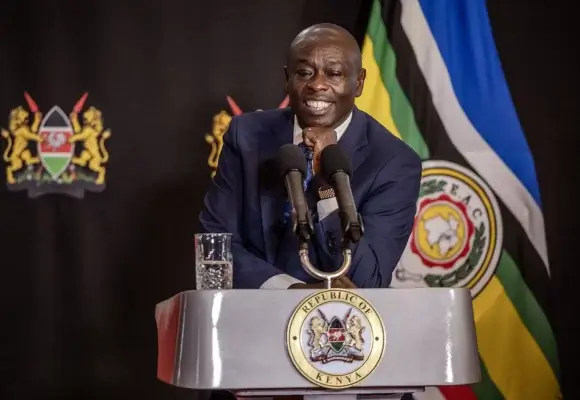|
LISTEN TO THIS THE AFRICANA VOICE ARTICLE NOW
Getting your Trinity Audio player ready...
|
Authorities in Kenya Thursday arrested a local government official accused of facilitating the fraudulent registration of Kenyan national identity documents for two terror suspects linked to a kidnapping plot. The suspect, Yussuf Maalim Issak, an Assistant Chief overseeing Bula Power Sub-location in Mandera Township, was taken into custody on Thursday by anti-terrorism detectives amid heightened security concerns in the region.
According to Kenya’s Directorate of Criminal Investigations (DCI), Issak allegedly assisted in procuring an identification acknowledgment slip, commonly known as an ID waiting card, for two suspected members of the Somalia-based militant group, Al-Shabaab. The suspects, identified as Isack Mohammed Abdi and Noor Yakub Ali, had allegedly infiltrated Kenya with a plan to abduct foreign workers engaged in a sewer construction project in Mandera town.
Authorities revealed that Abdi had recently entered Kenya from El-Ade, Somalia, and was using forged documents to pose as a Kenyan national. Intelligence reports indicated that he was prepared to pay Ksh 100,000 (approximately $700) to a local accomplice who would facilitate the planned abductions. The operation was part of a larger scheme to transport the kidnapped victims to Somalia for a ransom fee of Ksh 300,000 (about $2,100).
A security operation led to Abdi’s arrest on Monday, and a follow-up raid on Tuesday resulted in the capture of his accomplice, Noor Yakub Ali, in Mandera’s Metameta area. The two suspects are currently in custody and are expected to face terrorism-related charges under Kenya’s Prevention of Terrorism Act.
The arrest of the Assistant Chief has raised fresh concerns over the growing influence of Al-Shabaab within Kenya’s northeastern border region. Mandera, which shares a porous border with Somalia, has frequently been targeted by the militant group, leading to persistent security challenges. The situation has been exacerbated by suspected local collaborators who enable terrorist infiltration and operations.
The incident comes on the heels of another security crisis in Mandera, where five local government administrators were kidnapped earlier this month while traveling in Elwak, a town near the Somali border. The militants later demanded a ransom of Ksh 7 million (approximately $49,000) for their release.
In response to the escalating threat, Kenyan President William Ruto has directed the National Police Service (NPS) to intensify security operations in the region. The government has reiterated its commitment to safeguarding residents, foreign workers, and businesses in Mandera and its surrounding areas. Officials have also warned that individuals found aiding terrorist activities will face severe legal consequences.
The arrest comes just days after President William Ruto announced a major shift in Kenya’s national ID registration policy, declaring an end to the vetting process for individuals from Northern Kenya. The vetting procedure, which had been in place for years, was meant to prevent non-Kenyans—especially those linked to terror groups—from illegally obtaining national identity cards. However, the policy had long been criticized for discriminating against ethnic Somalis and other communities in the region, who often struggled to prove their citizenship.
While Ruto framed the decision as a step toward equality and inclusion, the move has been met with mixed reactions. Many Kenyans have expressed concern that eliminating vetting could open the door for Al-Shabaab militants to obtain Kenyan documents, potentially increasing security threats in the already volatile region. Critics argue that the system, while imperfect, was a necessary safeguard against infiltration by foreign militants.
Security experts have also warned that without proper checks, terrorist groups could exploit the new policy to facilitate movement across borders, access financial services, and even infiltrate government institutions. Others, however, have welcomed the policy change, arguing that thousands of genuine Kenyan citizens had been unfairly denied identification due to an opaque and discriminatory vetting process.











LEAVE A COMMENT
You must be logged in to post a comment.